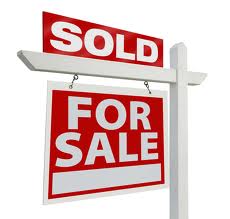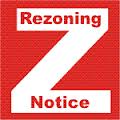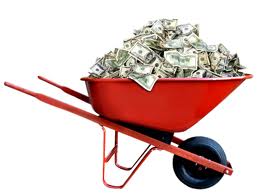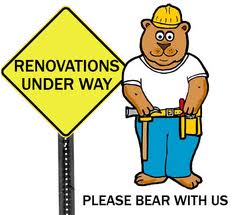Taxes on Flipping Canadian Real Estate – Capital Gains vs. Business Income
Allan Madan, CPA, CA
These days, it seems as though buying a property and then reselling it at a higher price is all the rage. On the surface, it seems like a terrific idea – buy a property, perhaps spend a little time and money fixing it up, and then sell it for a tidy profit. In today’s still-fragile economy and with the decline of the real estate market in many areas, it may seem that trying to make money in this manner seems risky, and in some ways this is true — but it still can be a worthwhile investment option as long as you have an understanding of the types of profits and most importantly, taxes on flipping Canadian real estate.
Capital Gains & Business Income – Defined

When you sell a stock, you owe taxes on your gains — the difference between what you paid for the stock and what you sold it for. The same is true with selling a home, but there are some special considerations that potential investors need to be aware of. Unfortunately, the majority of investors sell properties and automatically assume a capital gain has resulted, which is not necessarily the case. So what is a capital gain, and what is business income, and what taxes are associated with each?
Generally speaking, we can think of a capital gain as the profit from selling an income-generating asset. Business income on the other hand is typically generated where we sell an item or asset available for sale. With respect to taxes on flipping Canadian real estate, only 50% of the profits from a capital gain are taxed; consequently, many Canadian taxpayers are now trying to take advantage of the system by opting for the more favourable capital gains tax treatment. How is the determination of business income versus capital gains made?
Factors CRA Uses to Determine Capital Gains vs. Business Income
A profit arising from the sale of Canadian real estate can be considered to be business income, or a capital gain. However, most investors are unaware of the factors that the Canada Revenue Agency (“CRA”) considers in deciding how to categorize real estate profits – either as a capital gain or business income. The factors are follows:
1. Primary Intention. The way that CRA will view your intentions (at the time the property was purchased) is crucial when trying to assess the taxes you may face with flipping Canadian real estate. If your primary intention was to ‘flip’ the property (i.e. make a quick sale after buying it), then this in indicative of an income intention. On the other hand, if you planned to hold the property and receive rental income over time, the profit realized on the sale of the property will be classified as a capital gain. Since intention is very hard to prove (i.e. the CRA can’t read your mind), other factors are applied, as discussed below.

2. Zoning. The CRA looks to the zoning of the property as one of the determining factors. If the property is zoned for commercial use, or is changed from residential use to commercial use after the purchase, then the profit realized on the sale of the property will likely be classified as business income.
3. Repairs and Maintenance. Repairs and maintenance performed on the property by the taxpayer is also an important factor. If a property is purchased as a ‘fixer-upper’ and substantial renovations / improvements are made prior to the sale, the profit made on the sale will be categorized as business income.
4. Nature of your business or profession. Other employment or trade activities may influence the way CRA views your transactions – meaning the more closely a taxpayer’s occupation (e.g. builder, real estate agent) is related to selling or buying properties, the more likely it is that any profit from a property sale will be considered business income rather than a capital gain, and then taxed accordingly when flipping the property in Canada.
5. Money borrowed. The amount of money borrowed to purchase the property is another factor the CRA uses. If you are highly leveraged, meaning you borrowed heavily to buy the property, income treatment is more likely. On the other hand, if you used most of your own money to acquire the property, capital gains treatment is more likely.
6. How long you owned the property. If you owned the property you later sold for a profit for a very short period of time, then the profit will be classified as business income. However, if you held the property for a 
7. Frequency of selling real estate. If for example you’re acquiring several properties within a year and you have little to no other sources of income, then CRA will likely determine that your activities are primarily geared toward turning a profit and as a result, the property changes from a capital gain to a means of producing income that is subject to ordinary tax rates. On the other hand, if you have never bought and sold real estate before, then capital gains treatment is more realistic.
The factors that the CRA uses in respect of assessing taxes on flipping Canadian real estate must be examined as a whole. Any single factor by itself is not sufficient to draw a conclusion on whether a profit from the sale of Canadian real estate should be classified as a capital gain or business income.
Real Life Example that Went to Tax Court
In order to assess the way these factors come into play in determining the taxes you may face when flipping Canadian real estate, we will look to a real case that went to a Canadian tax court, where the judge decided that the appellant’s profit from his disposal of three buildings in 2004 and 2005 was business income, and not capital gain. This classification was made through the consideration of various factors, among them the appellant’s work as a construction/renovation contractor, his history of selling buildings for profit, a track record of performing maintenance and repair work himself on the buildings sold, and no ability to prove that he intended to keep the buildings for the long term. The appellant also did not live in any of the buildings sold during the aforementioned time period, nor did he declare any rental income for any of the properties.
The appellant was obviously upset with the Judge’s ruling. Remember, when it comes to taxes associated with flipping Canadian real estate, a capital gain is only half taxable, whereas business income if fully taxable.
Selling Your Own Home for a Profit
What happens when you sell your own home for a profit? Is the profit considered taxable business income, or is it a capital gain?
Principal Residence Exemption is Not Automatic
For most individuals that sell their primary residence (in which they live), the profit on the sale will be classified as a capital gain. However, the principal residence exemption can be claimed, which as the name infers, will exempt the capital gain from tax.
Note that the principal residence exemption is not automatic. You must demonstrate that you ordinarily lived in your home before it can be treated as your principal residence.
Some taxpayers try to outsmart the system, by claiming the principal residence exemption for the entire gain realized on the sale of a home, even though they lived in the home for a fraction of the time they owned it. The CRA has specific rules in place from stopping this abusive practice. One of the rules stipulates that you can only claim the principal residence exemption for the years that you lived in the property. For example, if you lived in a property for 3 of the 5 years that you owned it, then only 60% of the capital gain on sale can be exempted from tax.
Renovators and the Principal Residence Exemption

Certain taxpayers have been abusing the principal residence exemption to avoid paying taxes on flipping Canadian real estate. More specifically, these taxpayers purchase a home that they live in for a short period of time, make substantial renovations to the home, and then sell it for a profit while claiming the principal residence exemption. Once the property is sold, they immediately buy another home and start the process over again.
The CRA is cracking down on renovators who flip properties and claim the principal residence exemption each time. Instead of allowing capital gains treatment on the profits made, the CRA is treating the profits as fully taxable business income on which the principal residence cannot be claimed. In order to avoid this treatment by the CRA, you need to prove that you have another source of income, have consistently lived in the home that you sold, and that you did not purchase the home with the sole intention of selling it. Otherwise, CRA will have no reason to believe that you did not purchase or sell the property with the sole purpose of generating income from it, and which will not be considered to be a capital gain but rather business income and you will be taxed at twice the rate.
Disclaimer
The information provided on this page is intended to provide general information. The information does not take into account your personal situation and is not intended to be used without consultation from accounting and financial professionals. Allan Madan and Madan Chartered Accountant will not be held liable for any problems that arise from the usage of the information provided on this page.




Allan if a person buys a home and for first time and rent it out and he himself if live in a rented unit, will his purchased home if sold within 2 years of purchase is subjected to capital gain tax.?
You must live in the house in order to claim the principal residence exemption. Since you never lived in the home, you will have a capital gain / terminal loss when you sell it.
“The CRA is cracking down on renovators who flip properties and claim the principal residence exemption each time. Instead of allowing capital gains treatment on the profits made, the CRA is treating the profits as fully taxable business income on which the principal residence cannot be claimed. ”
Alan, please clarify the situation for me: If I purchase a home, live in it and meanwhile there renovate it, how long do I have to stay in it to claim the personal residency? Also, can I do this serially and still claim personal residency or after the 2rd or 3rd time, CRA may reclassify as Capital gains?
Thanks
There’s no minimum length of time that the CRA specifies. Generally speaking, the longer that you live in the property, the more support you have for claiming the principal residence exemption. If you are a serial flipper, there’s a good chance the CRA will assess the profits you made as business income, which is fully taxable.
Hi Allan,
If my partner and I incorporate a business and use the corporation to flip properties, is the corporation eligible for small business deduction? How much is the tax rate on the coproation’s business income in this case?
Hi Julie,
In this case, your corporation will be eligible for the small business deduction. The approximate corporate tax rate is 15%.
If a project is purchased for 100,000 and 30,000 dollars is used to fix it up, what portion of the profits are taxable if sold for 150,000. Is the profit deemed to be 20,000 after fixing up, or does CRA consider 50,000 dollars to be the profit?
Hi Brandon,
The taxable profit in your example is $20,000. You will pay income tax on this profit at your marginal tax rate.
I own a house in the name of my corporation. Have had it for approximately 4 years. Was going to move into it, but eventually rented it out. I am a small business (under $500,000) gross income. I am currently selling it, and I can’t figure out what my capital gains rate is. I was originally told it was 25%, then 50% of 100%, then 50%. My offers are coming in tomorrow at 6p. Do you have an answer for me on this?
Hi Brian,
The corporation will pay a tax of approximately 25% on each dollar of profit.
Allan what if the house you bought was purchased by an offshore company? The house was fixed up and the sale made $50000 would the offshore company pay capital gains or tax?
Hi Dave,
If the offshore company purchased and sold Canadian real estate for the purpose of making a short term profit, then it would be liable for paying business taxes in Canada on the profit made.
Allan,
If my husband and I (real estate agent) sold the rental property that was in our possession at least 3 years or longer, will we have to claim a business income or capital gain because one of us is a real estate agent? Thanks a lot!
Hi, Julia. The gain should be classified as a capital gain based on the fact that you both owned the rental property for 3 years.
Hi Allan,
I purchased an old bungalow and made a 2 story house with the intention to live in it. I had city permit opened for this purpose. Later on we needed to sell due to repeated noise and issues from the neighbours. We couldn’t stand it anymore. The house was in our posession for approx 2 years. We had no any other property.
Recently i received a general letter from CRA “possible ureported sale of condominium”…
Hi Alex, the CRA may be fishing to find out if your intention at the time of purchase was to flip this property for a profit, which is taxable. Your position is that you built the home to live in it, and had no intention of selling it, but you were forced to. As a result, the profit is not taxable, because you can claim the principal residence exemption on the sale of the home.
However, you may be liable for HST on the appraised value of the house at the time of completion, because you gutted the house and doubled its size.
what if i flip by buying and selling under a corporation name? how would that be treated?
Hi Kash, if you flip a property under a corporation, the profit will be classified as business income. Canadian controlled private corporations pay a low rate of tax on profits – 13.5% effective January 1, 2018.
Hello Allan,
If the flipping house is the business. Should we make the GST/HST report?
Should we open the GST/HST file?
Thank you. Irina
Hi Irina,
If you are making a substantial renovation (more than 90% of the wall space, ceiling space and floor space), then you must charge GST/HST on the sales price to the buyer.
I have 3 guys who got together and bought a home, renovated it and sold it. Only one of the guys purchased it and paid expenses. Is it better to claim all the business income on just the one guy or should i split it 3 ways.. They will be splitting all profits after everything is paid including GST. Thanks!
Hi Lisa,
If the three of you bought it together, then the income and expenses should be split 3 ways and report on your individual income tax returns (form T2125). One person can act as the registrant for HST purposes on behalf of all of you, and file a single HST Return. To do so, the designated person should complete form GST21. See https://www.canada.ca/en/revenue-agency/services/forms-publications/forms/gst21.html
Allan
Our daughter is disabled and receives disability payments. She did not work and is raising her son alone. About 11 years ago my wife and I purchased a new townhouse and never charged rent, paid all taxes and utilities and never claimed anything on income tax. Her son will be going to College so they want to re-locate to another City. We plan on selling the Townhouse and buying another place for them in the new location. After 11 years there is a significant difference in value from the time we purchased, and we did not intend on buying for business reasons.
Can we defer the majority of the capital gains because we are purchasing a replacement home for them?
Hi Jerry,
Unfortunately, you cannot defer capital gains tax by purchasing a replacement property for them.
Hi Allen,
How long should someone live in a fully-renovated or new-built house in order to avoid the HST? If someone is a serial builder, can he hold the house a few months as a place of residence and just pay the income tax?
The HST is applied to the land value which makes this tax a bigger problem.
The guideline says “As a builder, if you sell a substantially renovated house before it has been occupied by any individual as their place of residence, you are required to collect the GST/HST on the sale, and the purchaser may be entitled to claim a GST/HST new housing rebate.”
Thank you.
Hi Nick,
If you are a serial builder, you run the risk of the CRA assessing the profit made as business income, and applying HST to the entire sales price. I would at least stay in the home for 2 years or longer, but there is no guarantee.
I have brought a Pre-Construction Home .But I want to sell it as I did not expect the completion date to be the first date of completion on my agreement. My son is in grade 12th and I will have pick and drop him to school till June 2024(My closing is Feb 2024).Looking at the current market I think I will incur a loss when I sell this house.
I will be selling some of my stocks to pay the down payments, which will incur capital gain
My question is
During my taxes can I negate some from my Capital Gain with the loses I incurred during my House Flipping.
Hi Hegde,
Personal-use loss: If the property was purchased with the intention of using it as a personal residence or for personal use, the loss on the sale is considered a personal-use loss. Under tax law, personal-use losses are non-deductible against other types of income, including capital gains. This means that you cannot use the loss from selling the property to offset any capital gains you may have from other investments.
Business loss: On the other hand, if your intention at the time of purchase was to acquire the property for resale or to assign it for a profit (for example, flipping the property), the loss is considered a business loss. A business loss, in this case, can be treated differently and may be deductible against capital gains income or other sources of income